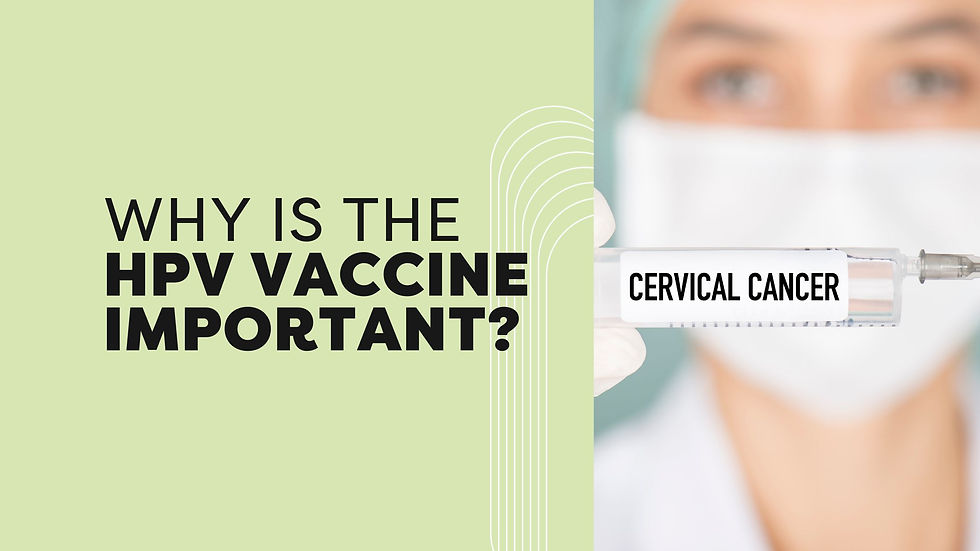Cervical Cancer Screening: Pap Smear vs HPV DNA Test
- Camtech Health Editor

- Feb 24, 2022
- 3 min read
Updated: Nov 15, 2023
Pap smear has been the ‘gold standard’ for cervical cancer testing for more than 60 years. However, a new screening method for HPV through HPV DNA test has started to rival the Pap smear.

Various strains of the human papillomavirus (HPV), a sexually transmitted infection that cause nearly all cervical cancer cases, have emerged in recent years. Therefore, the HPV DNA test has become more successful in assessing cervical cancer risk than the Pap smear.
HPV DNA Test vs Pap Smear
Both HPV DNA test and Pap smear involve scraping and brushing cells from your cervix.
Pap smear will examine the collected cervical cells for abnormalities, such as cells that show changes that could increase the risk of cervical cancer.
The HPV DNA test will examine the collected cervical cells for the presence of HPV infections and identify the types of HPV virus strains that are most likely to lead to cervical cancer.
In a nutshell, Pap smear only looks for cell abnormalities, while the HPV DNA test looks for viral DNA material that causes cervical cancer.
Why do I need a Pap and HPV test?
A Pap test can save your life. It can find cervical cancer cells early. The chance of successful treatment of cervical cancer is very high if the disease is caught early. Pap tests can also find abnormal cervical cells before they become cancer (precancers). Removing these precancers prevents cervical cancer over 95% of the time.
An HPV test can give your doctor more information about the cells from your cervix. For example, if the Pap test shows abnormal cervical cells, the HPV test can show whether you have a type of HPV that causes cervical cancer.
Who does not need to get regular Pap or HPV tests?
The only women who may not need regular Pap or HPV tests are:
Women older than 65 who have had three normal Pap tests or two normal co-tests in a row within the last 10 years, with the most recent test happening within the last 5 years, and who have been told by their doctors that they don’t need to be tested anymore
Women who do not have a cervix (usually because of a hysterectomy) and who do not have a history of cervical cancer or abnormal Pap test results
Always talk to your doctor or nurse before stopping regular Pap and HPV tests.
Are Pap and HPV tests painful?
Some women find Pap and HPV tests uncomfortable, but the tests should not be painful. You will feel pressure as your doctor or nurse puts the speculum (a tool that helps your doctor or nurse see your cervix) into your vagina.
If you have never had sexual intercourse or if you have had pain when something is put into your vagina, you can ask your doctor or nurse to use a smaller speculum.
You can also help lessen or prevent pain by urinating before the test to empty your bladder or by taking an over-the-counter pain reliever, such as aspirin, acetaminophen, or ibuprofen, about an hour before your Pap or HPV test.
How do I prepare for a Pap or HPV test?
You do not have to do anything special to prepare for a Pap or HPV test. Also, you should not douche before a Pap or HPV test. Most doctors do not recommend douching for any reason. You also should not put anything in or around your vagina to clean it, other than soap and water on the outside of your vagina.
Can I get a Pap or HPV test when I am having my period?
Yes, you can get a Pap or HPV test during your period. It’s better to schedule the test for a time when you do not expect to have your period. But it’s also better to get a Pap test at any time than to miss your appointment because of your period.
Depending on how heavy your flow is, your period may affect the results of the Pap or HPV test. If you’re uncomfortable or not sure, call your doctor or nurse before your appointment.
So which one should I do on my next screening?
Singapore’s Ministry of Health recommends that all women aged 25 and above who have ever had sex should have either a Pap smear once every three years (for women 25 to 29 years old) or an HPV (or HPV DNA) test once every five years (for women 30 years and above).
Understand more about cervical cancer symptoms and for women who are 30 years & above, it is recommended to go for regular HPV tests if you have had sex before.
References:




Comments